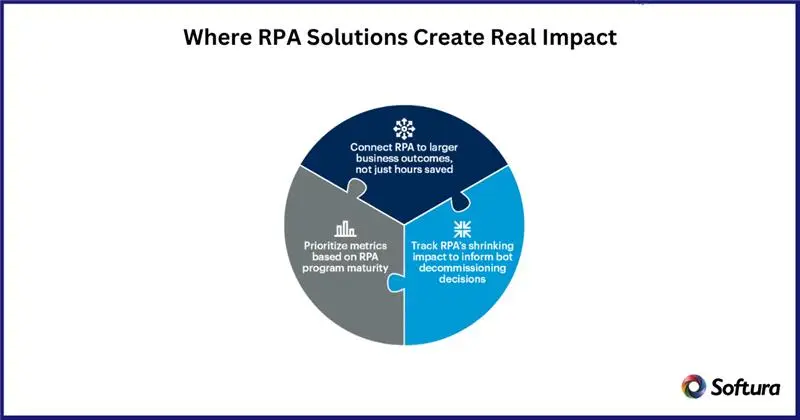"Our integration with the Google Nest smart thermostats through Aidoo Pro represents an unprecedented leap forward for our industry."
- Antonio Mediato, founder and CEO of Airzone.
A logistics provider eliminated over 50,000 manual entries a month by automating invoice reconciliation. And not just logistics industries, but finance, healthcare, and manufacturing are redefining their operations with automation. That is not just savings; it is an operational reinvention. These are the results robotic process automation solutions deliver for businesses that stop treating automation as a luxury and start seeing it as a necessity.
In this blog, we explore why 2025 will be a defining year for RPA solutions, not just for cost efficiency but also for strategic impact, resilience, and digital agility. If you are a decision-maker looking for more than buzzwords, this blog is for you.
Business leaders prioritize automation in response to rising operational costs, talent shortages, and an urgency to scale faster. Robotic process automation solutions enable organizations to meet those demands without upending their infrastructure.
In 2025, automation will not be a value-add but a core strategic pillar. This shift reflects a broader recognition that scaling is not sustainable without intelligent automation. But it’s not just about scaling faster; how RPA solutions themselves are evolving is even more transformative.
"Our integration with the Google Nest smart thermostats through Aidoo Pro represents an unprecedented leap forward for our industry."
- Antonio Mediato, founder and CEO of Airzone.
Modern RPA tools have matured. They are no longer confined to back-office processes; they are now deeply embedded in the digital fabric of enterprise ecosystems.
Today’s RPA solutions increasingly integrate AI techniques like natural language processing (NLP) and real-time exception handling, enabling bots to adapt dynamically to changing scenarios. AI enhances RPA from a “speed tool” to a performance enhancer, improving accuracy, collaboration, and governance across the board. These improvements signal a transition from task-based automation to ecosystem-wide orchestration.
Automation is faster. But that is just the beginning.
The real ROI of RPA comes from better decision-making and process control:
Modern RPA does not just eliminate steps; it elevates your organization’s process intelligence. It transforms workflows into reliable, data-driven assets that empower leaders to act faster and more confidently. These capabilities are translating into real-world impact across industries.
Looking for Offshore Dedicated Developers?
Our skilled experts are ready to help. Let's discuss your automation needs.
"By analyzing the data from our connected lights, devices and systems, our goal is to create additional value for our customers through data-enabled services that unlock new capabilities and experiences."
- Harsh Chitale, leader of Philips Lighting’s Professional Business.
According to reviews on trusted platforms like Peer Spot, RPA is driving impact across industries and departments:
In each case, hours of human effort are replaced by seconds of automated precision. The ripple effect? Leaner operations, happier teams, and faster time-to-value. To unlock similar results, selecting the right RPA strategy is critical.
"By analyzing the data from our connected lights, devices and systems, our goal is to create additional value for our customers through data-enabled services that unlock new capabilities and experiences."
- Harsh Chitale, leader of Philips Lighting’s Professional Business.

Not all robotic process automation solutions offer the same value. The right RPA journey begins with -
While vendor reviews can offer insights, selecting the right solution and strategy for your business needs requires expert guidance. Understanding your organization's pain points is the first step toward defining the right automation approach.
Beyond eliminating repetitive tasks, RPA tackles deep-rooted operational inefficiencies that hinder scalability and accuracy. Manual handoffs across systems cause delays. RPA automates these interactions for seamless process flow.
With the right RPA strategy, you accelerate work while reclaiming control over fragmented processes, enabling proactive decision-making, and boosting organizational agility.
RPA is evolving beyond basic task automation, blending with AI, analytics, and intelligent decision-making capabilities to deliver next-generation business agility.
This evolution means that RPA is no longer a departmental tool; it's becoming central to enterprise-wide digital strategies. As organizations seek greater speed, responsiveness, and customer-centricity, RPA is shifting from departmental use cases to C-suite-level strategic initiatives. Expect RPA to move from a tactical fix to a core business transformation lever
Softura helps businesses design and deliver automation strategies that drive real results. We guide you from business case software development to platform selection and seamless integration.
We offer:
Businesses that delay automation risk losing competitive ground. With its strategic RPA expertise, you can move faster, smarter, and ahead of the curve.
Robotic process automation has moved beyond routine tasks to become a powerful catalyst for speed, control, and scalable growth. In 2025, businesses that embrace intelligent automation will not just keep pace, they will set the pace. Building an intelligent automation roadmap empowers enterprises to replace manual processes, drive faster decisions, increase agility, and strengthen their competitive advantage.
Connect with Softura today to move from manual bottlenecks to intelligent acceleration.
Are you ready for your next project?
Curious how much manual effort your processes still rely on? Let us assess your workflows and map out the smartest RPA-driven automation strategy for your business.
They involve updating legacy software to modern platforms and architectures to improve scalability, reduce costs, and support innovation.
RPA improves operational speed, reduces manual errors, cuts costs, and increases team efficiency across business processes.
RPA addresses inefficiencies caused by manual tasks, human errors, compliance risks, and process delays in data-intensive operations.
Process automation solutions use digital technologies to streamline workflows, reduce human intervention, and enhance business productivity.